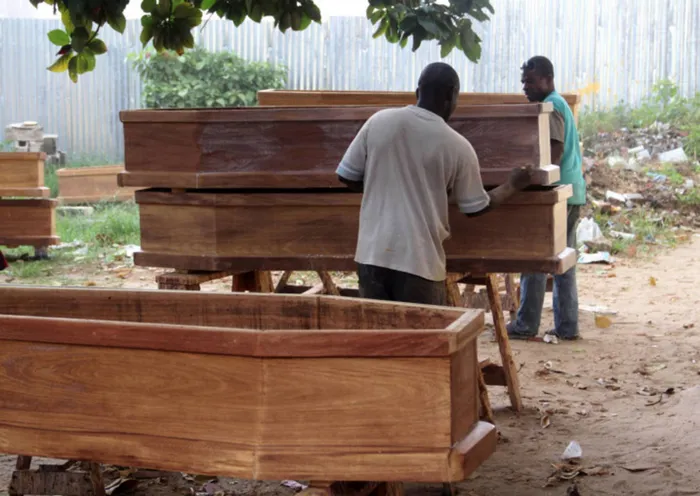More than 100 to get Congo state funeral

Men craft coffins for some of the more than 200 people killed by explosions at a munitions depot in Brazzaville, Congo. Men craft coffins for some of the more than 200 people killed by explosions at a munitions depot in Brazzaville, Congo.
Brazzaville - Morgue workers hurried to finish washing the bodies of hundreds of people killed in last week's explosion at a Congo army base ahead of the their state funeral Sunday, which will mark the single largest loss of life in this Central African nation.
At least 246 people died one week ago when an arms depot inside a military barracks went up in flames, setting off a lethal downpour of grenades, mortars and shells.
The detonation flattened buildings, including churches, schools, dormitories and businesses, crushing scores of people. Only 168 of the bodies have been identified so far, according to morgue records, and the government ordered them to be laid to rest in identical coffins in order to convey the national character of the loss.
Overnight, families camped in front of the morgue, waiting for the name of their dead to be read on the outdoor speaker. They held shopping bags full of new clothes to dress their loves ones.
Coffins were being hauled out of a shed on a trolley, pushed by four men wearing face masks. When their turn came, families were given gas masks, and ushered into the tiled floor of the morgue. Inside female relatives washed the women's bodies, while male relatives washed the men's.
It is a tradition in Western Central Africa to wash the body of dead relatives. In Christian societies the dead are buried in their finest clothes, whereas in Muslim communities they are buried in a simple shroud.
On Saturday, an elderly man who had lost his child had a heart attack during the process, and was rushed away, said an emergency responder who asked not to be named because he was not authorized to speak to the press. Two women became hysterical, crying until they fainted and had to be hospitalized, he said.
After the body is washed, clothed and laid to rest, the coffin is wheeled out, with the family tailing behind. On Sunday morning, the coffins were loaded onto trucks, waiting to be transported to a downtown esplanade, where they will be displayed for the state ceremony.
The mother of a 16-year-old girl who died after being hit by a shell wept uncontrollably, as her child's coffin was rolled away. A man who had lost his son walked out of the morgue, his hand clasped over his mouth, while another woman stood alone, swaying from side to side, wailing. Her arms were raised, as if imploring the heavens.
The dead died of blunt trauma, crushed inside collapsed homes, under falling beams and ceilings. They were hit by grenades, mortars, shells and rockets. And the series of explosions also claimed the lives of those that were not directly touched, like Mireille Massanga, pregnant with her fourth child. When she heard the blast, she scooped up her children and ran as fast as she could for almost 1 mile (1.5 kilometers).
When she was out of harm's way, she stopped running, but her heart didn't. Her family rushed her to the emergency room, and she died in the long line of people waiting for treatment, said her cousin Rufin Tchikaya. “They thought she was in labor, and the hospital had no time to deal with a simple pregnancy,” he said, as her coffin was carried away by morgue workers.
Families were promised 500,000 francs (around $1000) per relative for burial clothes. Fights broke at the cashier set up inside the morgue when many were given far less.
Waiting for his family's name to be called out late Saturday, Paul Lubaki pulled out the receipt showing he received only $80 for his 4-year-old grandson. He says the child-sized dinner jacket cost $70, and he wanted his grandson to be buried in the finest outfit possible, so he also bought a new dress shirt, pants and a bow-tie, costing him several times the allotted amount. Anger at the government is reaching boiling point.
The government had promised three years ago to move the military arms depot located in the Mpila neighborhood in the northern part of the capital after a less deadly explosion in 2009. The depot was never moved. The cause of the fire that set of the detonation has been blamed on a short circuit, according to the government spokesman. But residents claim witnesses saw a soldier throw a cigarette butt inside the armory.
A soldier who worked at the barracks and who asked not to be named in keeping with military protocol stood silently outside the morgue, waiting for the name of his 22-year-old daughter to be called out. He had left the barracks just before the first blast at around 8 a.m. last Sunday. He said his daughter's body was so mangled under their destroyed house, that he initially walked past her corpse, not realizing it was his child.
His eyes watered when he was asked if he blamed the military for her death. He had a shopping bag with him, in which he had folded a new beaded bridal gown, still in its plastic covering. His daughter was never married and so he said he plans to bury her in the clothes of a princely bride. - Sapa-AP